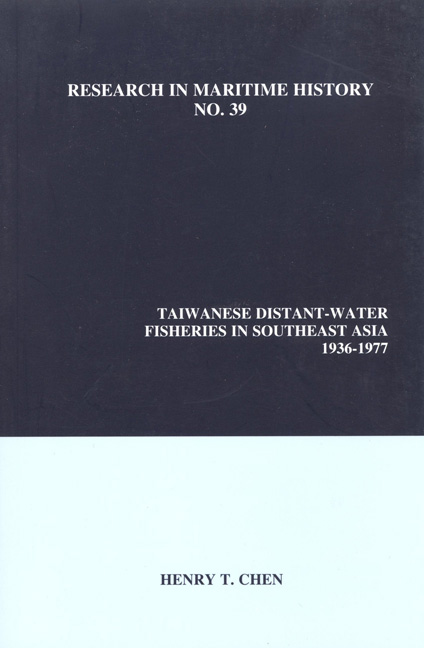Book contents
- Frontmatter
- Contents
- List of Tables
- List of Illustrations
- Notes on the Sources
- About the Author
- Acknowledgements
- Introduction
- Chapter 1 Japan and the Development of Taiwan's Fishing Industry
- Chapter 2 The Revival of the Fishing Industry in Postwar Taiwan
- Chapter 3 Kaohsiung Fishing Port and Its Fishing Ancillary Industries
- Chapter 4 The Taiwanese Fishing Industry and the Military-Political Complex
- Chapter 5 The Kaohsiung Fishing Industry and Its Ancillary Industries
- Chapter 6 The Development of Kaohsiung's Fishing Companies
- Chapter 7 Daily Lives at Sea, Fishing Zones and Politics
- Chapter 8 The Culture and Daily Life of the Kaohsiung Fishing Communities
- Chapter 9 The 1970s Crisis in the Taiwanese Fishing Industry
- Conclusion
- Appendix 1 List of Informants
- Select Bibliography
Chapter 7 - Daily Lives at Sea, Fishing Zones and Politics
- Frontmatter
- Contents
- List of Tables
- List of Illustrations
- Notes on the Sources
- About the Author
- Acknowledgements
- Introduction
- Chapter 1 Japan and the Development of Taiwan's Fishing Industry
- Chapter 2 The Revival of the Fishing Industry in Postwar Taiwan
- Chapter 3 Kaohsiung Fishing Port and Its Fishing Ancillary Industries
- Chapter 4 The Taiwanese Fishing Industry and the Military-Political Complex
- Chapter 5 The Kaohsiung Fishing Industry and Its Ancillary Industries
- Chapter 6 The Development of Kaohsiung's Fishing Companies
- Chapter 7 Daily Lives at Sea, Fishing Zones and Politics
- Chapter 8 The Culture and Daily Life of the Kaohsiung Fishing Communities
- Chapter 9 The 1970s Crisis in the Taiwanese Fishing Industry
- Conclusion
- Appendix 1 List of Informants
- Select Bibliography
Summary
Since fishermen spent most of their time working at sea, their daily lives during fishing trips is an important, if neglected topic in Taiwan's maritime history. In this chapter I will discuss the fishers’ roles, responsibilities and onboard politics. The fishing master, radio operator and engineman were the three most powerful figures on a vessel; I will explain the basis of their power and examine their interactions with other crew members as well as their personal feelings about their time at sea. Since the various fishing sectors had different practices which affected the daily lives of the fishers, I will map the fishing grounds as well as the major species targeted and their seasons.
The Fishers’ Roles and Onboard Politics
Most of the time, the fishing master was the most experienced fisher. He might have come from a fishing family, or he might have started his career in his teens. He was apt to be semi-literate and to speak and write roughly. Nonetheless, he was extremely familiar with the ecology of his fishing ground and the range of technologies and techniques. In the 1950s and 1960s, the only navigation aids fishers had were nautical charts, compasses and sextants. A fishing master therefore had to rely on his experience and deep ecological knowledge which took years to accumulate.
The fishing master was also the most powerful figure. In many cases, he was also a shareholder, so the owner had to respect him. Moreover, the he was in charge of the recruitment and employment of new fishers with the exception of radio operators. Those who wanted work had to curry favour with him rather than with the vessel owner. Some fishing masters even expected extra money from novices at the end of a voyage. While new recruits resented these practices, none expressed their feelings publicly because the fishing master also assessed their work performances in reports to his company. This made the fishing master so powerful that no one, except perhaps the radioman, would challenge his authority.
On board the vessel, the fishing master was the “financial hub.” He looked after the money the owner entrusted to him and took charge of all onboard financial affairs, especially the allocation of food allowances. Fishing masters could easily embezzle some of the money.
- Type
- Chapter
- Information
- Taiwanese Distant-Water Fisheries in Southeast Asia, 1936–1977 , pp. 121 - 142Publisher: Liverpool University PressPrint publication year: 2009



